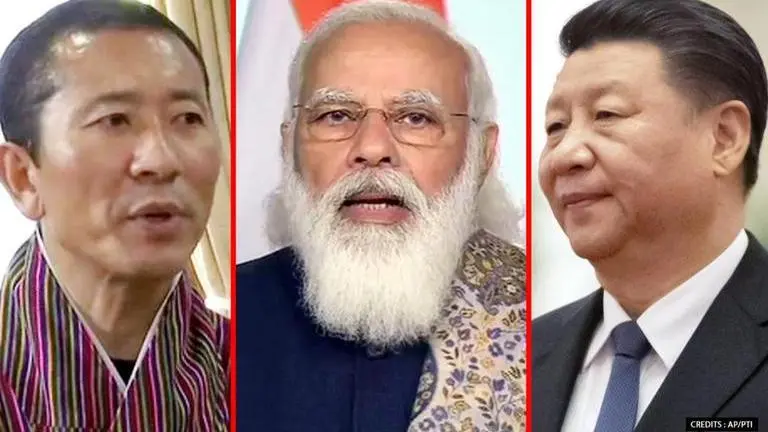Updated 9 May 2021 at 08:32 IST
China constructing villages, outposts inside Bhutanese territory
Since the announcement in 2015, China has been constructing a previously unnoticed network of roads, buildings and military infrastructure within Bhutan.
- World News
- 4 min read

In 2015, China had announced that a new village, called Gyalaphug in Tibetan or Jieluobu in Chinese, had been established in the south of Tibet Autonomous Region (TAR). Gyalaphug is, however, different; it is in Bhutan and Chinese officials have crossed and violated an international border.
Since the announcement in 2015, China has been constructing a previously unnoticed network of roads, buildings and military infrastructure within the territory internationally and historically understood to be Bhutanese itself. Post deliberated escalation in China's long-established endeavour to outflank India and its neighbours along the Himalayas, the recent construction is part of a significant mission by Chinese President Xi Jinping to fortify the Tibetan borderlands.
China's territorial assertiveness despite Treaty with Bhutan
This concludes China's aim to force the Bhutanese government to cede territory that China wants elsewhere in Bhutan to give Beijing a military advantage in their tiff with New Delhi. This is definitely a strategy that is more provocative than anything China has done around its borders in the recent past.
In 1998, China had signed a formal agreement with Bhutan, recognising the latter's sovereignty and its territorial integrity and agreed that "no unilateral action will be taken to change the status quo on the border."
Therefore construction within the periphery of Bhutan is a grave violation of the terms of China's founding treaty with Bhutan and oblivious to Bhutanese history of decades of protests regarding smaller infractions elsewhere on the borders. At present, all of the Menchuma Valley and most of the Beyul Khenpajong areas in Bhutan are operated by China. Since 1980s, China has been explicit about its claim over Beyul.
Advertisement
According to the Director of Modern Tibetan Studies and professor at Columbia University in New York, Robert Barnett, China's multilevel construction drive within Bhutan has gone almost unnoticed by the outside world. Bhutan may not have realised the full extent of China's activity on its northern borders or have remained silent. In 2017, China's attempt to build a cross road across the Doklam plateau in southwestern Bhutan, next to a trijunction with India, had triggered a 73 day faceoff between hundreds of Indian and Chinese troops. This had to be abandoned later.
Barnett writes for Foreign Policy, "By mirroring in the Himalayas the provocative tactics it has used in the South China Sea, Beijing is risking its relations with its neighbors, whose needs and interests it has always claimed to respect, and jeopardizing its reputation worldwide." He also wrote- if Bhutan declines to risk ties with India, Beijing shift will have seriously damaged a previously amicable relationship for little or no gain.
This attempt is quite similar to China's provocative and nettlesome tactics in the South China Sea which has risked the country's relation with neighbours of subcontinent and successfully jeopardizing its reputation worldwide.
Advertisement
South China Sea feud has soured relations between China & its neighbouring countries
Disputes over the South China Sea, have compelled several foreign entities to outpour their opinions and inculpate China. In a recent development, international public opinion raised concern over the domineering Chinese coast guard forces in the Sea to serve the country's unilateral sovereignty claim in the East Sea alias South China Sea.
China has been more assertive in sovereignty disputes of the Spratly Islands in the South China Sea. The said islands are subject to a territorial dispute and are in whole or partly claimed by numerous countries, namely, Brunei, China, Malaysia, Philippines, Taiwan and Vietnam. China claims virtually all of the South China Sea while the Philippines claim the Spratly Islands as being within its exclusive economic zone alias West Philippines.
A United Nations tribunal dismissed China's claim to virtually claiming all sovereignty of the South China Sea. Earlier, Beijing had rejected this ruling. The Chinese statement insisted that China's sovereignty, rights and vested interests in the South China Sea were formed in the 'long course of history and consistent with international law' and rejected the 2016 tribunal ruling as "null and void".
The power projection comes in the backdrop of China's ascending maritime activities in South China Sea. Experts have noted this increase in China's presence in the Sea as a response to Beijing's concerns over sizeable increase in US military presence in the region. This has escalated the Sino-US feud.
Last month, the European Union inculpated China to have jeopardised peace in the South China Sea. The EU urged all its parties to abide by the ruling of a 2016 tribunal in order to eliminate most of China's claim to sovereignty in the sea.
(With agency inputs)
Published By : Srishti Jha
Published On: 9 May 2021 at 08:32 IST
